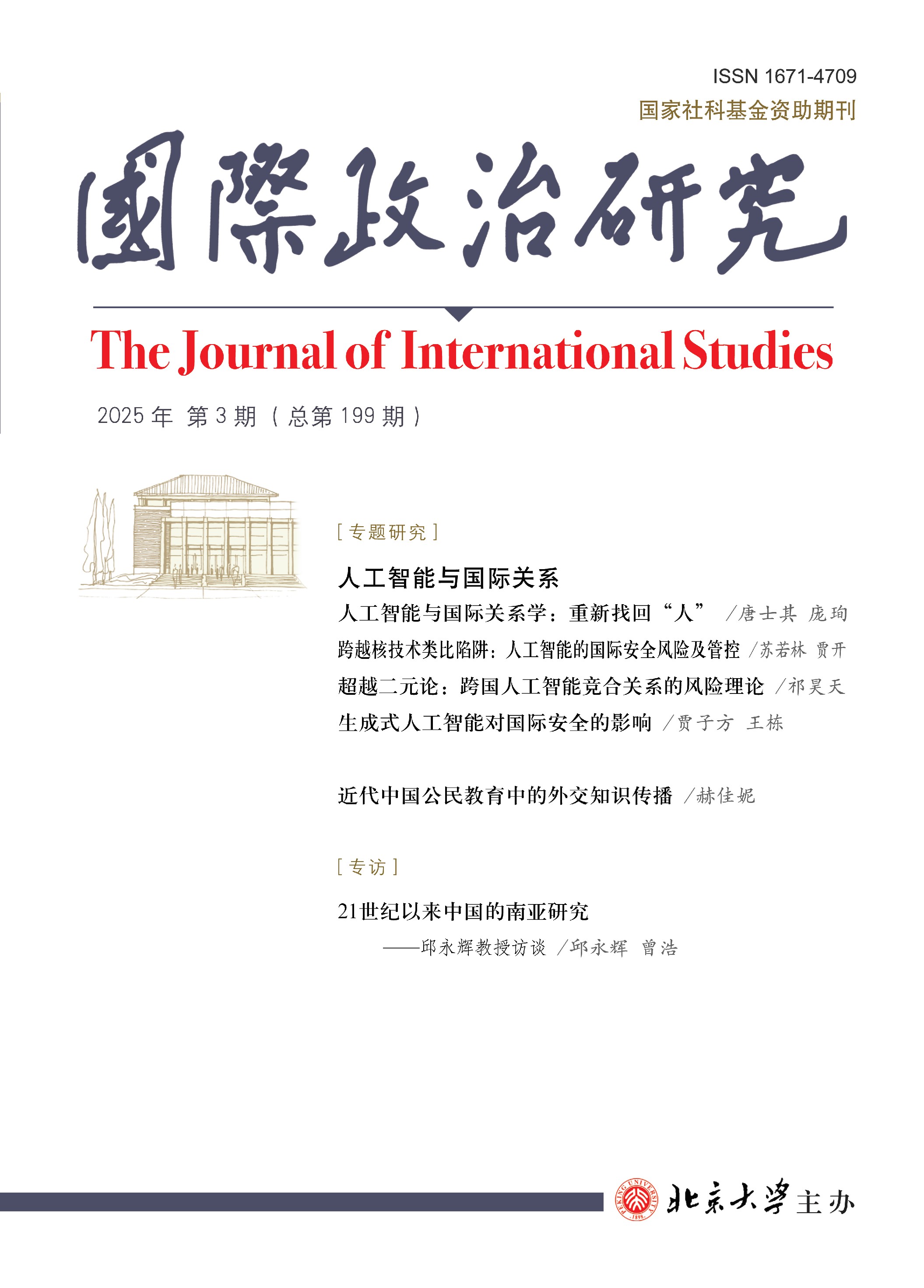
ISSN:1671-4709
Latest Issue:Volume 46,Number 1,
August 2025
THE JOURNAL OF INTERNATIONAL STUDIES is a bimonthly academic journal sponsored by Peking University and published by the School of International Studies of Peking University and the Society of China Association of Higher Education. As a leading journal in international studies in China, it is open to contributions by Chinese and foreign scholars and invites submission of academic articles on international relations theories, international security, international political economy, area studies as well as Chinese politics and foreign policy.
One significant impact of artificial intelligence (AI) advancement on international relations (IR) studies lies in its compulsion for the discipline to reflect upon and reconsider the dual habitual thinking patterns of “dehumanization” and “anthropomorphization.” This technological revolution presents an opportunity to recentralize the “human” in the discipline. “Benevolence” (ren) and “wisdom” (zhi) constitute two key dimensions of humanity, characterized by free will and the resulting complexity, uncertainty, and possibilities. While AI can mimic human intellectual activities and expressions of benevolence, it lacks the intrinsic capacity to experience ren and zhi, rendering it “human-like but not human.” This insight directly addresses the academic limitations and dilemmas faced by IR in its theoretical construction and disciplinary concerns, which often simplify research subjects through rational assumptions. In the AI era, IR must critically re-examine its traditional “human-neglecting” approach, shifting toward a human-centered research paradigm that prioritizes individual well-being, emotions, and morality. This entails transcending conventional rationalist assumptions and exploring a balance between technology and humanism to ensure AI serves as a technological force that safeguards rather than diminishes humanity.
During the Republican era, the relationship between the individual, the state, and the world was a central theme in civics textbooks when presenting knowledge about diplomacy. Situated within the confluence of post-World War I idealism and escalating nationalism, these textbooks conceptualized individuals as “members of humanity” and sought to cultivate “world citizens” dedicated to human welfare, while grounding this vision in “national citizenship”. As the National Revolution swept across China and Nationalist Party ideological indoctrination intensified, the acquisition of knowledge concerning international affairs became integral to fostering “Three People’s Principles revolutionary citizens.” A qualified citizen possessing diplomatic knowledge was expected to be, foremost, a collective member capable of wielding the Three People’s Principles as ideological armor, demonstrating unwavering loyalty to Nationalist Party doctrine, and maintaining strict adherence to leadership and discipline. While civics textbooks explained “diplomacy” to the public, they also utilized the production and dissemination of diplomatic knowledge to shape domestic society. This dual function illuminates both the international dimensions of Republican-era civic education and demonstrates the domestic political utility of “diplomacy” as both educational resource and knowledge apparatus.
Generative Artificial Intelligence can generate information similar to that produced by humans, with the added benefits of low cost, high efficiency, and versatility. To study the international security implications of this disruptive technology, cognitive warfare effectiveness and characteristics should be selected as intermediate variables, and the research should be conducted through the cognitive warfare approach. In the context of cognitive warfare, Generative Artificial Intelligence applications can rapidly generate huge amounts of cognitive warfare information, improving combat effectiveness. Surpassing the limitations of information generated by human being, it enables the rapid evolution of cognitive warfare information and causes long-term information pollution, thereby promoting the evolution of new intelligent cognitive warfare. The new, technology-driven cognitive warfare may deepen the division and confrontation between countries and increase the risk of conflicts.
Transnational AI relations involve intricate interactions between competition and cooperation that cannot be adequately explained through a simplistic binary framework of “competition versus cooperation.” Introducing two key attributes of risk-“risk level” and “risk identifiability”-helps facilitate a more nuanced typology and analysis of transnational AI relations. High-risk scenarios often encompass military deployments, critical infrastructure management, and sensitive data processing, potentially resulting in severe and immediate consequences. Conversely, low-risk scenarios usually involve commercial applications and societal services, where risks remain relatively manageable. Highly identifiable risks typically relate to technological issues, whereas low identifiability risks emerge from complex interactions and long-term indirect consequences. Based on comparative analyses of AI risk attributes across various technological categories and application contexts, transnational AI relations can be categorized into four distinct types: regulatory prevention, collaborative development, competition-confrontation, and cautious isolation. Furthermore, differences in how actors perceive risk levels can lead to asymmetrical cooperative preferences and security practices, increasing governance complexity and the probability of frictions. Through discussions of illustrative cases such as military modernization competition, risk management of strategic weaponry, cooperation in green industries, competition involving large language models, and governance of computing power energy consumption, the validity of this risk-based theoretical framework is demonstrated and supported.
Security assistance aims to improve the security governance capabilities of partner countries through operation supporting, capability building, equipment and technical assistance, and logistical support. Western countries conceal their geopolitical concerns in their security assistance by two different logics. One is to bring the emerging civil support into security assistance so as to dilute its geopolitical concerns, and the other is to fully include conflict management, stabilization and peacetime so as to highlight the public goods attribute of security assistance. However, such measures are difficult to be effective. On the one hand, traditional military assistance dominates Western security assistance. On the other hand, existing Western security assistance insists on monopolized provision and refuses cooperation based on the division of labor. Thus far Western practices of security assistance often export liberal peace theory, induce supply competition, and make more trouble for partner countries. Based on developmental peace theory, the Global Security Initiative proposed by China aims to promote the division of labor and cooperation of security assistance and enduring peace in partner countries, which could contribute to re-establishing the public goods attribute of security assistance.